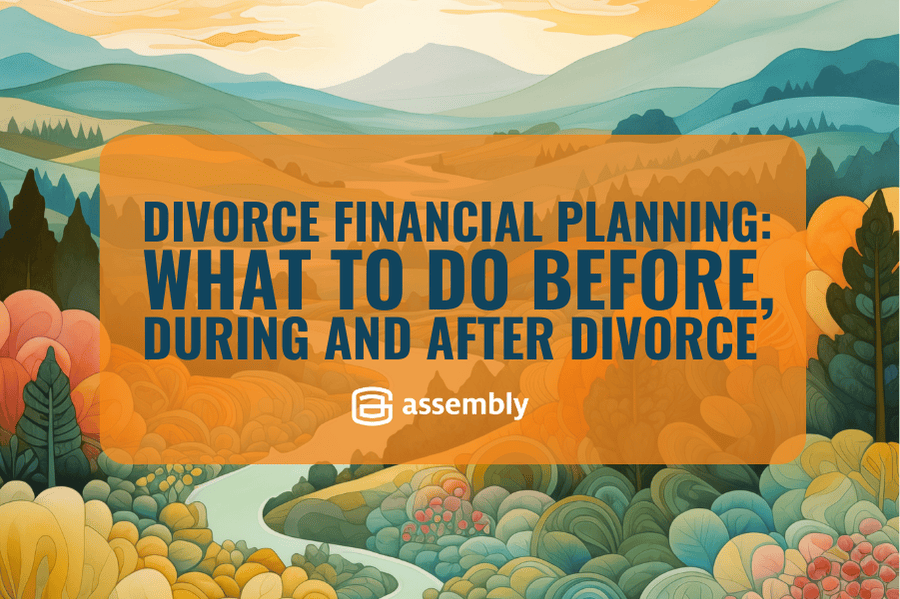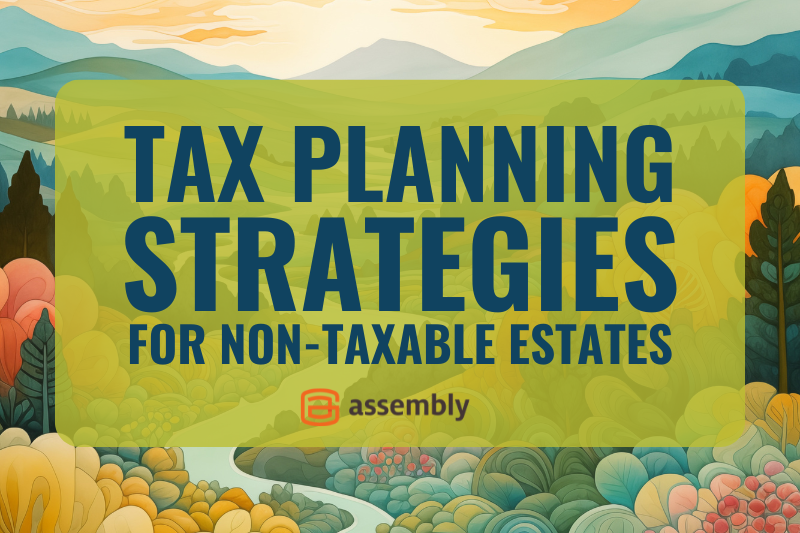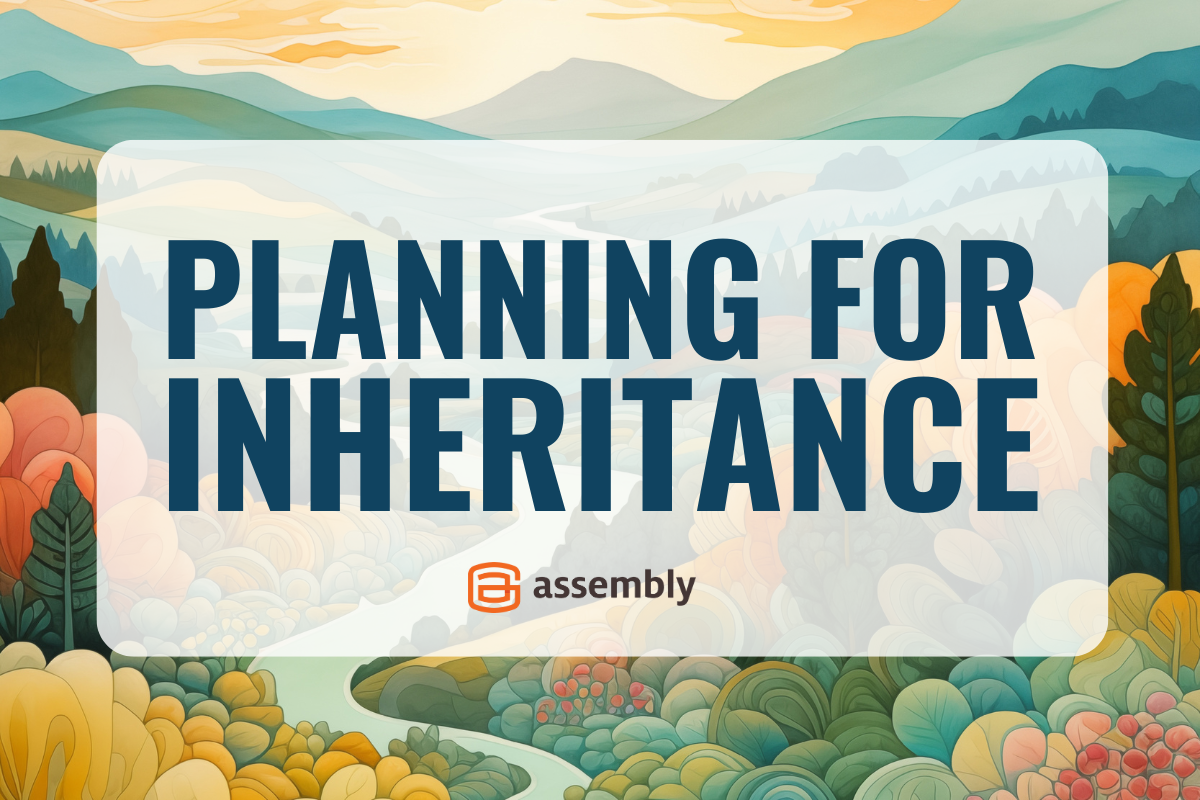Divorce Financial Planning: What to Do Before, During and After Divorce
Going through a divorce is emotionally and financially challenging. Whether you're considering a divorce, in the midst of negotiations, or adjusting...
4 min read
 Gabriel Burczyk
:
Jul 12, 2024 3:21:14 PM
Gabriel Burczyk
:
Jul 12, 2024 3:21:14 PM

Many Americans don’t have an estate plan because they don't like to think about a time when they will no longer be around. It's understandable, but if you want to protect your assets and leave a meaningful legacy, you need a plan in place.
The last thing you want to do is make important decisions about your estate in the middle of a crisis. Or worse, pass on without a plan and leave your assets and family in limbo.
The good news is: you don’t have to go it alone. You can:
There’s another important reason to create (or revise) your estate plan. The current federal estate tax exemption levels expire at the end of 2025.
The existing thresholds for federal estate tax exemptions sunset at the end of 2025. Unless Congress passes new legislation, Uncle Sam will take a bigger bite out of gifts and estates valued at $7 million+ for individuals and $14 million+ for married couples (estimated).
Estates valued above these exemption levels may be taxed up to 40%. Contact us for a free consultation to find out if your estate plan is as tax-efficient as possible.
Nearly 49% of high net-worth individuals don’t have an estate plan because they don’t think they’re old enough to need one (source: KeyBank). But as the saying goes, it’s better to hope for the best and plan for the worst.
One of the main reasons to set up a living trust is to avoid probate. For those who are unfamiliar, probate is a court-supervised process where a deceased person’s assets are distributed to heirs and other beneficiaries.
In California, probate is triggered when the deceased’s total assets are greater than $166,250. In New York, the threshold is only $50,000. Most other states have a threshold somewhere in between those two.
Generally speaking, the probate process takes 9-18 months. The more assets and beneficiaries the deceased has, the longer the process can take.
By setting up a trust, you can avoid the delay and hassles of probate and save thousands of dollars. For example, a client of Assembly Wealth recently saved his heirs $58,000 by titling his properties in a revocable trust instead of a will. In addition to the significant savings, the family keeps their financial affairs private.
You can set up your trust to distribute your assets upon your death or delay distribution over a set period. You can also withhold assets if certain circumstances are not met. Your trustee(s) will ensure your wishes are fulfilled.
Your trustee can distribute and withhold assets based on the guidelines you establish. They’re also responsible for reporting the distribution of assets and tax compliance. Learn more about the roles and responsibilities of a trustee.
If you choose a family member as your trustee, they can hire professional experts such as a CPA, financial advisor, lawyer, etc. You can also designate a team of trustees. The blended approach of family and professional trustees can help ensure your estate is distributed in accordance with your wishes. You can also work with an independent trustee (no family member involvement). Whomever you choose, it’s important the individuals or entities can be objective, understand your family dynamics and manage conflict.
If your family includes both adults and younger children, you may wish to set aside money for each generation. You can structure your trust so money is distributed at certain ages or when certain conditions are met (such as being accepted into a degree program).
If you’ve put off creating an estate plan because you aren’t ready to talk to your kids about their inheritance — or lack of inheritance — you’re not alone. The Motley Fool recently surveyed 2000 high-net-worth individuals (people with net assets of at least one million dollars) and two-thirds said they were worried about leaving too large of an inheritance to their heirs. The most common concern mentioned was that the money would be used “irresponsibly.”
Some people create a generation-skipping trust where grandchildren, grand nieces and nephews are the only heirs. Reasons for choosing this option can vary. The adult children may already be well off, but a common reason is to potentially avoid paying estate taxes twice on the same assets— once when passing to children and then again when those assets get passed on to grandchildren.
The most important part of creating a generation-skipping trust is communication. Adult children may be counting on receiving an inheritance and, when they receive nothing, the situation could spiral into something very unpleasant.
James Brown left a significant sum to pay for his grandchildren’s education and the education of underprivileged children in his community. Unfortunately, because of numerous lawsuits, 15 years passed before his estate was settled.
An experienced financial advisor can help you:
If you’re concerned about how family members will spend your hard-earned money, donating some or all of your assets can help you leave a legacy you can feel good about. The same survey of high net-worth individuals mentioned above also found two thirds plan to leave part of their estate to charity.
A donor-advised fund (DAF) allows you to leave a meaningful legacy and enjoy tax deductions while you’re still living.
You can establish a donor-advised fund with:
As the name suggests, you choose which organization(s) benefit from your fund. You can change the disbursement as often as you like and choose what happens to the fund after you pass. Learn more about how to reduce your taxable income by donating to charity.
Don’t wait until an accident, medical emergency or legislation forces you to make important decisions with limited time. An experienced wealth manager can:
Related Reading:
Fill out the form to be notified about new articles.

Going through a divorce is emotionally and financially challenging. Whether you're considering a divorce, in the midst of negotiations, or adjusting...

Through the end of 2025, only estates worth more than $13.61 million are subject to federal estate tax. Under the current law, only a tiny percentage...

To ensure your assets are distributed in accordance with your wishes, detailed financial planning is essential. Without a legal will, up-to-date...